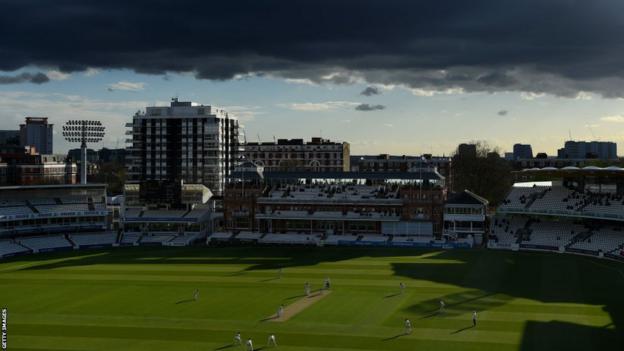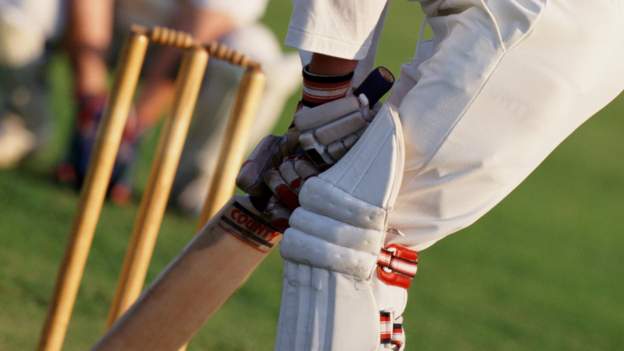
Racism, sexism, classism and elitism are “widespread” in English and Welsh cricket, according to a long-awaited independent report.
The Independent Commission for Equity in Cricket (ICEC) has delivered its findings from a two-year investigation.
The ICEC has made 44 recommendations, including that the England and Wales Cricket Board (ECB) make an unreserved public apology for its failings.
ECB chair Richard Thompson said: “We will use this moment to reset cricket.”
The ICEC was announced by the ECB in March 2021 in the wake of global movements such as Black Lives Matter and Me Too.
It opened an online call for evidence in November of that year, receiving 4,156 responses. In March 2022, a call for written evidence resulted in more than 150 responses.
Among those to give evidence include England men’s Test captain Ben Stokes, women’s captain Heather Knight, former men’s captain Joe Root, World Cup-winning skipper Eoin Morgan and Azeem Rafiq, the former Yorkshire player and racism whistleblower.
In a damning 317-page report called Holding Up A Mirror To Cricket, the ICEC concluded that:
- “Structural and institutional racism” continues to exist within the game
- Women are treated as “subordinate” to men at all levels of the sport
- There is a prevalence of “elitism and class-based discrimination” in cricket
- Black cricket has been failed and the ECB must develop a plan to revive it
- Many who experience discrimination do not report it because of a distrust in the authorities
- Umpires regularly ignore abuse and dismiss complaints in both the professional and recreational game
“There remains a stark reality that cricket is not a ‘game for everyone’ and it is absolutely essential that the work required to achieve that ambition must begin immediately,” wrote ICEC chair Cindy Butts.
“Be in no doubt, what is needed now is leadership. I very much hope that the recommendations we make in this report will be adopted and driven forward by the ECB and all others in leadership positions.”
The report did praise the ECB for being “brave” enough to open itself to independent scrutiny.
Thompson, who became ECB chair last September, offered an “unreserved” apology.
“Cricket should be a game for everyone, and we know that this has not always been the case,” he said. “Powerful conclusions within the report also highlight that for too long women and black people were neglected. We are truly sorry for this.
“This report makes clear that historic structures and systems have failed to prevent discrimination, and highlights the pain and exclusion this has caused.
“I am determined that this wake-up call for cricket in England and Wales should not be wasted. We will use this moment to demonstrate that it is a game for all and we have a duty to put this right for current and future generations.”
The recommendations also include the equalisation of match fees between the England women’s and men’s teams with immediate effect, that the ECB reports on the state of equity in cricket every three years and the removal of annual fixtures between Eton and Harrow schools and Oxford and Cambridge universities from Lord’s.
‘Culture in cricket is rotten’
In light of allegations made by former Yorkshire spinner Rafiq, the ECB published a plan to tackle racism and all forms of discrimination in November 2021.
The ICEC said the significant response it received to its call for evidence was propelled by Rafiq’s appearance at a Digital, Culture, Media and Sport select committee hearing in the same month, when he labelled English cricket “institutionally racist”.
Of the respondents, 50% described experiencing discrimination during the course of the previous five years. The figures were higher for people from ethnically diverse communities: 87% of people with Pakistani and Bangladeshi heritage, 82% of people with Indian heritage and 75% of all black respondents.
“The persistence of interpersonal and structural racism in cricket is due, we believe, in part to a failure by the ECB to specifically and unambiguously name racism as a concern, at least until the recent crisis (and only then generally in reference to interpersonal and overt forms of racism),” said the report.
“Racism remains a widespread and serious problem in cricket across England and Wales and something that the ECB and the wider game should address with urgency.”
In its evidence to the report, the ECB admitted to a “lost generation” of black cricketers.
“Black adults are not playing cricket in sufficient numbers to even be picked up by surveys that measure participation in cricket,” said the ICEC report.
“A 2020 report by Sport England found that black participation was so low as to be statistically irrelevant, apparently lower than in golf and tennis.”
The ICEC has recommended that the ECB undertakes an “in-depth examination” of the decline in cricket among black communities within the next 12 months.
‘Culture of sexism and misogyny’
Though the report recognised “positive strides” made in the women’s game, it also highlighted a lack of female representation among decision-makers, less media exposure and fewer opportunities to play at premier grounds for elite women, and inequity in terms of kit and equipment available to women and girls.
The ICEC heard “evidence of a widespread culture of sexism and misogyny” and examples of men making unwanted and uninvited advances towards women.
The report was alarmed that England’s women have never played a Test at Lord’s, while the “home of cricket” continues to host an annual schools fixture between Eton and Harrow.
In terms of pay and investment, the women’s game receives an “embarrassingly small amount” when compared to the men’s game.
According to the report, an England women’s white-ball player receives a salary that is 20.6% that of her male equivalent and the allowance given to the women’s captain is 31% that of the men’s.
Domestically, the average salary of a woman in the regional structure is 45% that of a man at a first-class county, while in The Hundred the highest salary tier for women is £1,250 more than the lowest tier for men.
Even when players are excluded, there is an 18.8% gap in the average salary between female and male employees at the ECB.
The ICEC has recommended a “fundamental overhaul of the professional women players’ pay structure”.
This includes immediate parity between men’s and women’s international match fees, overall equal pay at international level by 2030 and equal pay in The Hundred in 2025.
‘Elitist and exclusionary’
A lack of cricket in state schools and a talent pathway structurally aligned to private schools is partly to blame for “elitism and class-based discrimination”, according to the report.
Some 58% of men to play for England in 2021 were privately educated, significantly higher than the 7% of the general population that went to private school.
To highlight the overrepresentation of privately educated people in the game, 42% of respondents to the ICEC’s own survey went to a private school.
The report also referenced the costs associated in participating in talent pathways and “conflicts of interests and biases” from coaches as further barriers to player progression.
“The structure and operation of the talent pathway remains a barrier to equity and inclusion across gender, class and race,” said the report. “It repeats and reinforces wider structural inequalities that exist across cricket in England and Wales.”
The ICEC’s recommendations that inter-county cricket should not begin before the age of 14 and all access to a county talent pathway programme should be free of charge by the 2025.
“We recommend that the entire talent pathway structure should be overhauled to make it more meritocratic, inclusive, accountable, transparent and consistent,” said the report.


